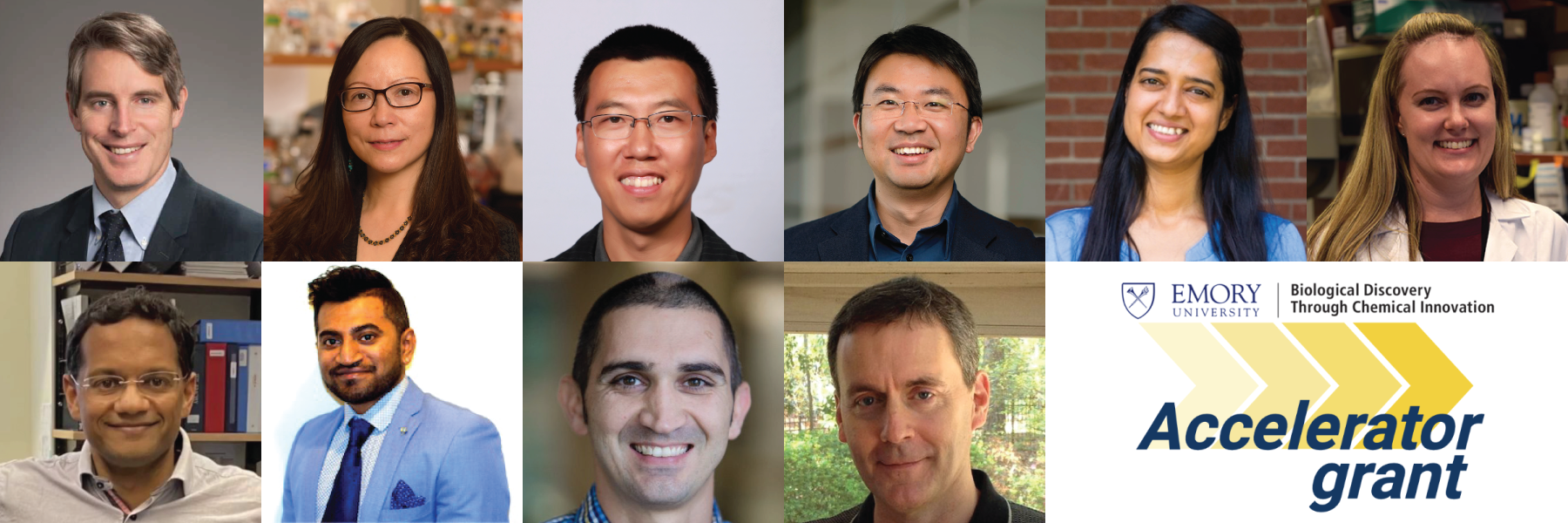Congratulations to the Year 4 BDCI Accelerator Grant Recipients!

We are thrilled to announce the recipients of the Year 4 BDCI Accelerator Grants! These grants aim to further cultivate the network of Emory researchers working at the critical intersection of chemistry, biology, and human health, and fund innovative, cross-disciplinary projects that align with the mission of the BDCI.
This year’s proposals span three major units at Emory, seven individual departments, multiple therapeutic areas, and a diverse set of technological approaches. These five groups will receive $40,000 over the next year to complete the aims outlined in their proposal, with the ultimate goal of providing the preliminary data necessary to apply for larger, extramural funding. The 2023 projects — along with their principal investigators and co-investigators — that received Accelerator Grants are:
Steven Goudy + Yuhong Du: Developing a high-throughput assay to identify p70 S6K activators to induce pediatric human osteoblast differentiation
Each year many children undergo craniofacial bone grafting due to maxillofacial trauma and congenital bone loss. Obtaining a bone graft in children is limited by the amount of donor material available and leads to prolonged pain and discomfort. Developing an off-the-shelf solution to reduce or obviate the need for bone grafting in children would improve health, reduce pain, and allow children to recover more quickly. This new collaboration between the Goudy lab and the Emory Chemical Biology Discovery Center (Yuhong Du) will unlock the potential for novel therapeutic treatments to improve recovery in children with craniofacial differences from congenital, traumatic, and oncologic conditions. They are excited to set out in their collaborative efforts to identify targets, develop assays, and translate their findings towards novel solutions for children. This is the first step towards building out an ecosystem of discovery for craniofacial regenerative therapies to improve health, reduce pain, and enhance recovery. Expect this team to push the envelope developing new therapies and translating them from the bench to the clinic!
Xu Liu + Mingji Dai: Structure-based design and optimization of selective glucocorticoids for inflammatory disorders
Glucocorticoids are the most widely used treatments for chronic inflammatory diseases such as allergies, asthma, and rheumatoid arthritis. However, the long-term use of glucocorticoids is associated with deleterious side effects. This collaborative project between the Liu and Dai labs aims to generate new glucocorticoids with improved safety profiles that enables their long-term usage and provides a safer replacement for traditional glucocorticoid therapy. This project will deepen the new collaboration between these groups and synergistically maximize their respective strengths in medicinal chemistry and structure-based drug design, all towards the development of novel glucocorticoids!
Monika Raj + Jennifer Spangle: Chemical sensors for imaging cellular aldehydes in live cells
The Raj and Spangle labs are very excited about receiving this award, which will help to establish a strong collaboration and to dive into a new area of research involving the development of fluorescent imaging agents to detect and quantify biological metabolites responsible for a variety of cancers. This research could lead to the discovery of diagnostic tools for the early detection of cancer biomarkers and prevent disease. They plan to use their Accelerator Grant funds to generate preliminary data to apply for extramural funding from the NIH!
Rabindra Tirouvanziam + Dharmeshkumar Patel: Computational drug discovery and testing of HDAC11 inhibitors/agonists for innate immunotherapy
The Tirouvanziam and Patel groups are excited to kick-start a new drug development effort under the auspices of the BDCI Accelerator Grant program. Their goal is to combine computational drug discovery and testing in biomimetic human lung models to develop novel HDAC11 modulators. HDAC11 plays a key role in programming of neutrophils, the most abundant white blood cells in humans. Leveraging their respective strengths as translational immunologists (Tirouvanziam) and computational chemists (Patel), this effort will develop treatments for conditions driven by misfiring neutrophils, including severe COVID-19, chronic obstructive pulmonary disease (projected to be the main cause of death in the world by 2030), cystic fibrosis, and “immunologically cold” cancers. We can’t wait to see what they accomplish under this award!
Bill Wuest + Philip Rather: Repurposing Salmeterol to treat resistant acinetobacter baumannii infections
The COVID-19 pandemic has added further pressure on the effectiveness of our antibiotic arsenal, likely exacerbating issues with antibiotic resistance. With this award, Wuest and Rather seek to investigate a previously approved drug (Salmeterol) with no previously known antibacterial activity to target and kill the gram-negative bacteria A. baumannii. They are excited to receive this funding to further bolster a newly burgeoning collaboration between their two labs toward the repurposing of approved drugs!
Please join us in congratulating our awardees! We look forward to hearing their progress and seeing what exciting breakthroughs come as a result of their work!
Applications for the next round of Accelerator Grants will open Fall 2023. Check back HERE for updates.